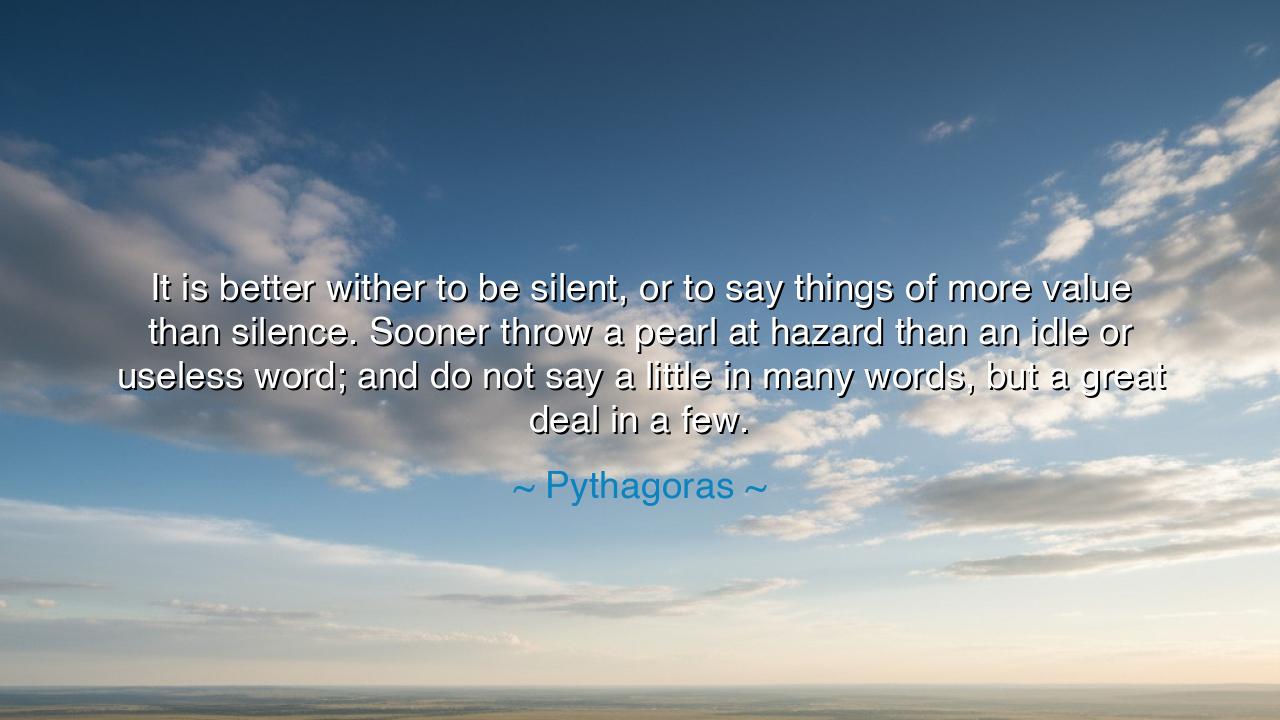
It is better wither to be silent, or to say things of more value
It is better wither to be silent, or to say things of more value than silence. Sooner throw a pearl at hazard than an idle or useless word; and do not say a little in many words, but a great deal in a few.






“It is better either to be silent, or to say things of more value than silence. Sooner throw a pearl at hazard than an idle or useless word; and do not say a little in many words, but a great deal in a few.” Thus spoke Pythagoras, the sage of Samos, whose wisdom reached far beyond the realm of numbers into the depths of the human soul. Though remembered for his theorems and geometry, Pythagoras was first a philosopher — a lover of truth — who believed that the power of speech is sacred, a divine gift not to be squandered. In these words, he warns us that language, though light upon the tongue, carries the weight of consequence. The word may build or destroy, heal or wound, enlighten or mislead; and so, to speak without care is to play dice with destiny.
In the Pythagorean schools of ancient Greece, silence was not ignorance — it was discipline. Students who came to learn from the master were first required to observe five years of silence, to still the clamor of vanity and learn the harmony of thought. Only when they had mastered the art of listening were they permitted to speak. For Pythagoras taught that silence is not the absence of sound, but the presence of wisdom — a fertile soil from which meaningful words may grow. To speak well, one must first learn to be still, for truth is a whisper heard only in the quiet heart.
“Sooner throw a pearl at hazard than an idle or useless word.” In this single phrase, the philosopher reveals the worth of speech. Words are like pearls — rare, precious, and not easily formed. To cast them carelessly before the unthinking or the unworthy is to waste what is sacred. Idle talk, gossip, and vain chatter are the enemies of clarity. They clutter the mind and cloud the spirit. The wise man does not adorn himself with noise, for he knows that every word spoken needlessly diminishes his strength. Better to hold the tongue and let one’s deeds speak; better to remain quiet and let truth find its own voice.
The story is told of Socrates, who, though born centuries after Pythagoras, lived by this very principle. When a man came to him with a rumor, Socrates replied, “Before you tell me, let it pass through three sieves — truth, goodness, and usefulness. If it fails any of these, it is not worth speaking.” Thus, he preserved his peace and the dignity of speech. He, too, knew that the word is an instrument of the soul — a tool of reason and a vessel of virtue. To misuse it is to betray the mind that wields it.
“Do not say a little in many words, but a great deal in a few.” Here, Pythagoras teaches the art of precision — the economy of wisdom. A single word of truth weighs more than a thousand empty phrases. The greatest teachers, prophets, and poets have always spoken with brevity and power. Think of the Stoics, who condensed vast oceans of wisdom into a handful of sentences; or the Christ, who changed the world with words as simple as, “Love one another.” In their speech, there was no waste, no ornament — only clarity, purpose, and soul. For it is not the length of speech that moves men’s hearts, but its truth and its light.
The ancients understood that the tongue is both weapon and medicine. In the marketplace, it could sow discord; in the temple, it could awaken peace. A careless word might break a bond that years of friendship had built; a single kind phrase might restore the faith of the weary. Thus, the wise spoke as though the gods were listening — for perhaps they were. They weighed their words as a jeweler weighs gold, for they knew that speech, once loosed, cannot be recalled. Even silence, once broken, cannot be mended.
And so, my children, learn from Pythagoras this eternal discipline. Guard your speech as you would your honor. When you speak, let your words shine like pearls — rare, thoughtful, and born of truth. Speak only when your words are better than your silence. When you are angry, wait; when you are unsure, listen; when you must speak, let every syllable carry meaning. Let your voice be gentle, but your message firm; your speech brief, but your wisdom deep.
For in the end, it is not the loud who are heard, but the wise who are remembered. The rivers that run deepest flow most silently. And so it is with the soul — the more it knows, the less it needs to speak. Choose silence when words are empty, and speech when silence would betray truth. In this balance lies not only wisdom, but greatness. For the man who governs his tongue governs his destiny, and the one who masters his words walks forever in the harmony of the eternal.






AAdministratorAdministrator
Welcome, honored guests. Please leave a comment, we will respond soon